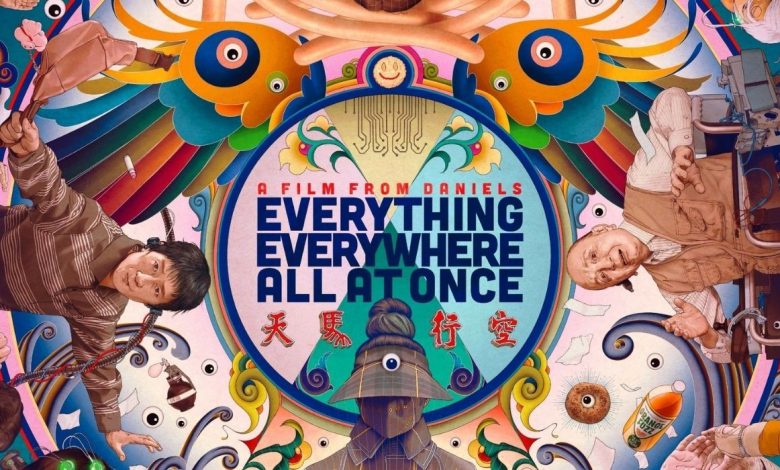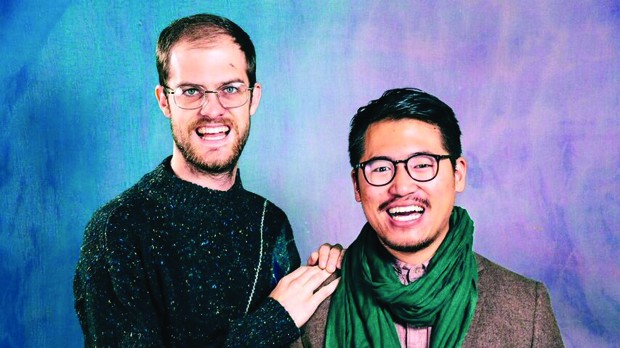Interview with Daniels on their film EVERYTHING EVERYWHERE ALL AT ONCE

By Abigail Lee ’25 / Emertainment Monthly Staff Writer
EVERYTHING EVERYWHERE ALL AT ONCE is the longest ride that you never want to end. A chaotic dive into the multiverse, the film is both impossibly expansive and crushingly intimate. Michelle Yeoh plays a Chinese-American immigrant who runs a laundromat with her husband Waymond. Facing a tax audit while also dealing with her strained marriage and rebellious daughter, Evelyn’s life becomes infinitely more complicated when she discovers she is essentially, The Chosen One. A different version of her husband, Alpha Waymond, guides Evelyn through the multiverse as she gears up to defeat a mysterious force named Jobu Tupaki.

Emerson alumni Dan Kwan and Daniel Scheinert (known as Daniels) bring together the metaphysical whirlwind that is EVERYTHING EVERYWHERE ALL AT ONCE. Emertainment Monthly got to participate in a college roundtable and chat with Daniels about their second feature.
This interview has been lightly edited for clarity. Slight spoilers ahead.
Where did Raccaccoonie come from?
Daniel Scheinert: It was our producer, Jonathan Wang. He’s half-Chinese but speaks better Mandarin than Dan. He’s been a part of this movie from the very beginning. His dad was a movie lover who never got the names right, and it was a family tradition to collect some of Dad’s misremembered movie names. John had told us some of those jokes, and we were like ‘Oh, maybe our character does that.’ We had various ones throughout the writing process, but that became our absolute favorite.
Dan Kwan: It really became magic when we were like, ‘Oh, she should definitely visit that universe,’ because if there are an infinite number of universes, then if you say it, it probably exists somewhere.
This film is based on a Chinese-American family. When you pitched that idea, were people receptive to it immediately?
Dan Kwan: Not really. No one said no to it, but at the same time, we were writing this movie before Crazy Rich Asians even came out. I like to joke that, you know, the butt plug fights and the hot dog hands were absurd, but an all Asian casted movie was just as absurd at the time. No one even thought it was viable, but like all of our projects, we kind of write as if they’re little prayers to the film gods being like, ‘Hopefully we’ll get to make this one day.’
Daniel Scheinert: Early on, we were able to say that we love action movies, we specifically love Hong Kong style action and that we were like, ‘We don’t want to cast unknowns.’ We were like, ‘We want to cast some of our heroes from those movies.’ That made it a somewhat easier pitch. It’s kind of wild to me [that style] had a moment years ago and hasn’t continued. It’s like, ‘Wait, why the fuck hasn’t Michelle Yeoh been doing Hollywood action movies for the last 20 years?’ She’s incredible.
Were your parents receptive to the movie? I’m curious because it’s from the point of view of a middle-aged woman, especially an immigrant. What have you heard from that generation?
Dan Kwan: The funny thing is a lot of people not even in that generation have come up to us and been like, ‘I love that it’s our parents.’ They really appreciate it because it’s unexpected. But my parents are funny. My dad watches a lot of movies. He’s watched more than me. He’s very film literate, so he got it immediately, and he loved it. He loves Michelle Yeoh, so he was just super blown away.
My mom falls asleep in everything. She doesn’t care about movies, [but] my mom said, ‘I didn’t fall asleep.’ I was like, ‘Okay, great compliment.’ But she can appreciate it without understanding it, and that’s kind of where we’re at now. She’s seen it twice, and I think the biggest thing that’s kind of hit her is not necessarily the film itself…but she can sit next to someone in the theater and watch them sob. That is enough for her to understand that we made something interesting or worthwhile. She’s very proud of me but still not really processing it. It was more important for my sisters to watch it, for my dad to watch it, for my brother—everyone else got it except for my mom, which was very funny.
With the Evelyn-Joy relationship, I thought it was really interesting that Evelyn’s life running the laundromat was the worst version of her life in the whole multiverse. It was funny and also a little heartbreaking. I saw my mom in her, but ultimately, the film is very positive toward the end. What were you trying to say about the immigrant life?
Dan Kwan: The immigrant story is so much about, what if, and wondering what could have happened. ‘What if I stayed? What if I went anywhere else?’ Especially once you have kids, you’re like, ‘What if I had a different kid? What if the kid was smarter or more hardworking or all these things that work really well within the multiverse?’ Because the multiverse is all about the possibilities and things like that. Even before Waymond says, ‘This is the worst version of you.’ That’s something she already knows, and I think that’s why it hits her so hard. She’s felt that her whole life.
Daniel Scheinert: Or [it’s] something that she’s feared.
Dan Kwan: Yeah, exactly, she fears or believes [it]. Obviously, it’s hyperbole, of course there’s gonna be much worse universes, but this was the universe where she just failed at the most things, disappointed herself in the most ways. The hard journey of this movie was her kind of having to go to hell and back so that she could finally come back and say, ‘No, this is where I belong.’ Not just being present and being thankful, but spiritually, to connect with someone you care about in a very chaotic attention economy where there’s billion dollar organizations trying to steal your attention constantly. One of the hardest things you can do is just to pay attention to someone. Turning that exchange into something cosmic and spiritual felt really important, so it’s not just about saying, ‘I can accept my life.’ It’s also to be like, ‘I can see that everyday moments [are] a transcendent experience.
Daniel Scheinert: So she’s not her worst self. That’s just what Alpha Waymond thinks.
Are you making the kinds of movies now that you wanted to make back when you were film students?
Dan Kwan: When I was a film student, I couldn’t even imagine making this movie.
Daniel Scheinert: Yeah, this is too aspirational.
Dan Kwan: I can’t imagine this movie even existing in general.
Daniel Scheinert: I feel like every step of the way we’ve been pretty selfish filmmakers in a way that I’m proud of. We weren’t obsessed with breaking into the industry necessarily. We wanted to make things we wanted to make. When we started out in music videos, we got reps to start sending us projects, and we would pitch things we wanted to make, and bands would be like, ‘No!’ I’m so proud in retrospect that we just stuck to our guns, and we just pitched really bizarre things until we got that reputation. It’s been 10 years of making what we wanted to make, which, oh my god, we’re so lucky. We know people who’ve made a lot more money along the way, but I would not trade it for getting to…
Dan Kwan: Do whatever you want at this point. It’s a little scary because after this movie, it seems like people will just let us do whatever we want. That’s not fun.
Daniel Scheinert: I have some ideas that should not be greenlit. [Laughing.]
Dan Kwan: But I think part of our process is chasing after the rejection…every project is a dare to the universe like ‘I dare you to let us make this.’ When people say yes to everything, it’s no longer fun. I don’t know, maybe we’ll quit after this.
Daniel Scheinert: We have to run for office, I guess, because that’s what we should absolutely not do.
first
YAAAAAAS SLAYYYYY ABBY WOOOOOOOOOOOOOOOK